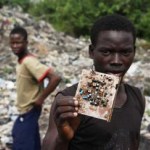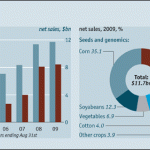sustainability
GOOD has an interesting series of articles called No More Dirty Looks about the cosmetics that we use every day and what options are available for safer, more environmentally sound beauty products, without any toxic carcinogens, endocrine disruptors, or petrochemicals. Yesterday they linked to a terrifying video from The Story of Stuff Project describing the limits of regulation on toxic chemicals used in everyday products from lipstick to baby shampoo:
The best line of the video I think comes in about halfway through, when talking about hair relaxers and skin whiteners advertised to young…
Everyone's favorite Slovenian philsopher, Slavoj Žižek, discussing his provocative perspective on nature, ecology, biotechnology, and climate change while dumpster diving:
via Immanent Discursivity (thanks Nick!)
How do you help people who live on less than a dollar a day?
This is one of the challenges that the Bill and Melinda Gates Foundation is taking on. In preparation for a recent visit there, Raoul and I reread a speech that Bill Gates gave at the 2009 world food prize symposium
It is worth a read.
He points out that three-quarters of the world's poorest people get their food and income by farming small plots of land. So if we can make small-holder farming more productive and more profitable, we can have a massive impact on hunger and nutrition and poverty.
If we are successful, we can also…
I don't usually like to post links from BoingBoing because I imagine everyone has already seen this already, but as it is about some of my favorite things (synthetic biology, biomaterials, and fashion) I couldn't resist!
Designer Suzanne Lee makes clothes using cellulose-based fabrics made entirely by cultures of yeast and bacteria. From what I could understand from the ecouterre article, the process is similar to how kombucha is made, using the microbes to ferment a green tea mixture, although I thought that the film that forms on top of the fermenting tea in kombucha is some sort of yeast/…
iGEM officially starts for the Harvard team tomorrow for some good old-fashioned fun with BioBricks, arabidopsis, protein-based sweeteners, and shRNA! Our goal is to make a system for genetically engineering plants safely and easily with some hopefully fun and useful applications in the short term. iGEM (the International Genetically Engineered Machines competition) is about fun and open science, so we hope you enjoy following along with our adventure on our wiki, blog, twitter, or even become a fan on facebook. As a proud teaching fellow I'll be posting updates here periodically all summer,…
Some thoughtful and interesting letters in response to the OpEd that James McWilliams and I wrote recently for the NY Times. Here are some highlights:
I think that there are many in the organic food movement who recognize that genetic engineering has a role to play in the future of food. But concerns about what it should be, and who should be making that decision, are valid. I am all for nonprofit groups and university researchers working to alleviate starvation in the third world. I trust their motivations and scientific integrity. I have no such faith in agribusiness.
Traditional small…
The number of people on Earth is expected to shoot up from the current 6.7 billion to 9.2 billion by 2050. How will we feed them? If we continue with current farming practices, vast amounts of wilderness will be lost, millions of birds and billions of insects will die, and farm workers will be exposed to more and more chemicals. And still, we will not have enough food. Clearly, there must be a better way.
Some scientists and policymakers suggest that genetic engineering, a modern form of crop modification, will dramatically reduce our dependence on pesticides, enhance the health of our…
This Op-Ed just published today in the NY TImes.
Here it is with links and a few edits.
A REPORT by the National Research Council last month gave ammunition to both sides in the debate over the cultivation of genetically engineered crops. More than 80 percent of the corn, soybeans and cotton grown in the United States is genetically engineered, and the report details the "long and impressive list of benefits" that has come from these crops, including improved soil quality, reduced erosion and reduced insecticide use.
It also confirmed predictions that widespread cultivation of these crops…
Many people in synthetic biology, including myself and much of my lab, are working on using biology to make things more efficiently, renewably, and sustainably. Being able to make plastic replacing biomaterials, chemicals, medicines, and fuels in living cells from renewable resources (especially in photosynthetic organisms that need only sunlight and water) will undoubtedly decrease our dependence on fossil fuels and with a lot of work in policy and process and infrastructure engineering may one day become truly sustainable. It's difficult to not notice, however, how unsustainable most…
A number of commenters to my previous post argued that I'm being unfair to Earth Day - of course, there's greenwashing. of course people are cashing in, but underlying the greenwashing, there's something good and serious and worthwhile there and I'm being churlish to deny it.
And in some ways, I agree that both points are true - I am a little churlish about Earth Day, and there are some good things about it. For example, because Earth Day is an established "holiday," (it comes in after Mother's Day and Valentine's Day and probably before Father's Day and Groundhogs Day in minor holidays by…
I bloody hate Earth Day. No offense to those of you who love it, and I know there are some awesome Earth Day programs out there, but by the time we get there, I'm spending my days hiding under the covers, because every freakin' time I open my email inbox a wave of the most nauseating spew of greenwashing comes flowing out.
Guess what? A major department store chain, nearly in bankruptcy, is now selling the eco-tote, made from organic sheepskin, embossed with "Think Global, Act Local" to show your care for the earth and indifference to grammar. And not to trouble me, but just so you know,…
For the 2010 Pi day bakeoff, I baked a Swiss chard-Gruyere pie.
Shown here is the backdrop to our garden:a mural on the side of our barn, painted with California poppies, rice plants, sunflowers and (look closely) a red double helix. Artist: Jim McCall, Elastic Media.
Here is the recipe:
First, gather as many ingredients as you can from your garden. In our garden, I found multi-colored swiss chard, Kale, chives, thyme and parsley.
Next, prepare the crust:
1 cup barley flour2 cups white flour
1 tsp salt
1 cup unsalted butter
1/2 cup unsalted margarine, frozen
grated rind of 1…
If you are a poor farmer in China, do you care if Monsanto dominates the seed industry in the US?
Apparently not. Several recent reports indicate a rapid launch of GE crops in the less developed world- independent of the US corporate seed industry.
The first news story, reported in the Wall Street Journal and by Reuters is that China has approved release of the worlds first genetically engineered rice. The Bt rice, which was developed by China's Huazhong Agricultural University, is predicted to reduce the use of insecticides by 80 percent while raising yields by as much as 8 percent. This is…
An appropriate technology, as asserted by the economist Schumacher in his book Small is Beautiful, should promote values such as health, beauty, and permanence. Low cost and low maintenance requirements are also of prime importance in Schumacher's definition.
Considering both Schumacher's observations and the goals for ecological farming:
⢠Produce abundant, safe and nutritious food
⢠Reduce harmful environmental inputs
⢠Provide healthful conditions for farm workers
⢠Protect the genetic make-up of native species
⢠Enhance crop genetic diversity
⢠Foster soil fertility
⢠Improve the…
Kent J. Bradford, Professor of Plant Sciences and Academic Director of the Seed Biotechnology Center at UC Davis, is today's guest blogger.
Ever since our ancestors adopted an agricultural lifestyle about 10,000 years ago, our own sustainability has been intimately tied with that of our food production systems. Those systems currently support 6.7 billion humans, or more correctly, adequately support about 5.9 billion with another 800 million or so suffering from food insecurity, malnutrition or hunger. Compare that with the 1960's when the world population was 3 billion, with 1 billion…
Alice and I have been talking about the big and small ways that universities could act to improve the environment, but Earth Day is also about making personal changes to lessen your environmental impact.
So it's fitting that Mike Dunford has issued us an Earth Day challenge:
I'd like you to take a minute or two to come up with three things that you can do to be more environmentally friendly. The first should be something that's small, and easy to do. The second should be more ambitious - something you'll try to do, but might not manage to pull off. The third should be something you can do to…
"It's not really that hard to understand" is the catch phrase in this YouTube video featuring Herman Daly, the subject is the insanity of the economic cult of perpetual growth:
I got this from the most recent posting at Things Break, which you should read and be sure to follow the links.
I would also offer here the very compelling image from New Scientist that isn't actually clickable from TB's post.
(this image is courtesy of New Scientist and is part of this article)





